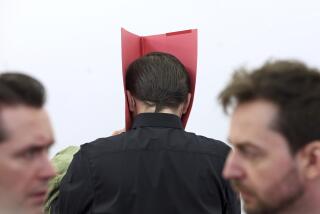Doctors Asked to Scrap the Scribble
President Bush prodded doctors and hospitals Thursday to make better use of computers to share patient information, saying the healthcare industry’s continued reliance on paper records was inflating costs and undermining care.
Participating in a talk-show-style “conversation” with Cleveland-area medical personnel, Bush said the development of a nationwide data-sharing network was an integral part of his agenda for reducing healthcare costs.
“Most industries in America have used information technology to make their businesses more cost-effective ... and the truth of the matter is, healthcare hasn’t,” Bush said.
“We’ve got fantastic new pharmaceuticals that help save lives, but we’ve got docs still writing records by hand.”
Bush said the responsibility for adopting advanced information technology would remain in the private sector, but that Washington planned to play a role by providing money for demonstration projects.
The White House said an important step in that process would be “E-prescribing,” a program that would enable Medicare doctors, participants and pharmacists to fill prescriptions by computer.
On Thursday, the Department of Health and Human Services issued rules to implement the program, which will begin when the new Medicare drug benefit takes effect in January 2006.
In addition, the White House said the president’s proposed 2006 budget would seek $125 million for projects to demonstrate the effectiveness of healthcare information technology. The president also will ask Congress to pass a supplemental appropriation doubling this year’s funding to $100 million.
“When you multiply the efficiencies to be gained all across the spectrum ... some predict that you can save 20% off the cost of healthcare as a result of the advent of information technology,” Bush said.
Bush’s information technology initiative is one of the less controversial elements of his healthcare agenda, which includes expanded use of tax-sheltered health savings accounts and limits on medical malpractice jury awards.
Some critics contend that the president’s overall program would shift more of the escalating cost of healthcare to patients without providing sufficient resources to help them assume the added burden.
Thursday’s event was held at the Cleveland Clinic medical complex, where about 1,200 physicians use the Internet to share information about their patients. Bush appeared onstage with white-jacketed doctors and hospital personnel who described the benefits of what one called the “medical information highway.”
“When an electronic medical record system is in place, a patient will never have to worry about taking the wrong dose or taking the wrong medicine ... simply because somebody couldn’t read the handwriting on a piece of paper,” said Martin Harris, the clinic’s chief information officer.
The doctors acknowledged there was still considerable resistance within their profession to embracing Internet-based data sharing because of concerns about confidentiality, but they said that those who tried it tended to become believers.
Patricia McGinley, a patient of Cleveland Clinic physician Robert Juhasz, said she became a convert after discovering she could use her home computer to obtain and interpret her blood test results, assuaging her anxiety before she could meet with Juhasz to discuss them.
“I went from feeling helpless to feeling in complete control,” McGinley told the president. “It really did make me feel like I was part of the decision-making process.”
More to Read
Start your day right
Sign up for Essential California for news, features and recommendations from the L.A. Times and beyond in your inbox six days a week.
You may occasionally receive promotional content from the Los Angeles Times.






